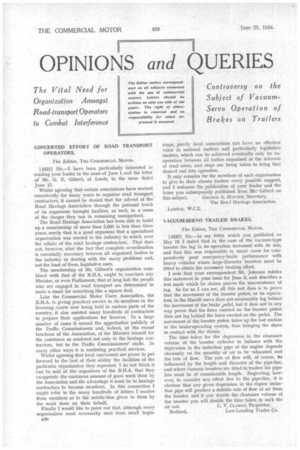OPINIONS and QUERIES
Page 44

If you've noticed an error in this article please click here to report it so we can fix it.
The Vital Need for Organization Amongst Road-transport Operators to Combat Interference Controversy on the Subject of VacuumServo Operation of Brakes on Trailers
CONCERTED EFFORT OF ROAD TRANSPORT OPERATORS.
• The Editor, THE COMMERCIAL MOTOR,
[4332] Sir,—I have been particularly interested in reading your leader in the issue of June 1 and the letter of Mr. G. R. Gilbert, of Leeds, in the issue dated June 15.
Whilst agreeing that certain associations have worked consistently for many years to organize road transport contractors, it cannot be denied that the advent of the Road Haulage Association through the personal touch of its organizers brought hauliers, as such, to a sense of the danger they ran in remaining unorganized.
The Road Haulage Association has been able to build up a membership of more than 5,000 in less than three years, surely that is a good argument that a specialized organization was needed in the industry to watch over the affairs of the road haulage contractors. That does not, however, alter the fact that complete co-ordination is essentially necessary between all organized bodies in the industry in dealing with the many problems and, not the least of them, legislative ones.
The membership of Mr. Gilbert's organization combined with that of the R.H.A. ought to convince any Minister, or even Parliament, that at long last the people who arc engaged in road transport are determined to make a stand for something like a square deal.
Like the Commercial Motor Users Association, the R.H.A. is giving practical service to its members in the licensing courts now being held in various parts of the country, it also assisted many hundreds of contractors to prepare their applications for licences. In a large number of cases it earned the approbation publicly of the Traffic Commissioners and, indeed, at the recent luncheon of the Association, of the Minister himself for the assistance so rendered not only to the haulage contractors, but to the Traffic Commissioners' staffs. In many other ways it is rendering practical services.
Whilst agreeing that local canvassers are prone to put forward to the best of their ability the facilities of the particular organization they represent, I do not think it can be said of the organizers of the R.H.A. that they exaggerate the enormous amount of good work done by the Association and the advantage it must be to haulage contractors to become members. In this connection I might refer to the many hundreds of letters I receive from members as to the satisfaction given to them by the work done on their behalf.
Finally I would like to point out that, although every organization must necessarily start from small beginB30 nings, purely local associations can have no effective voice in national matters and particularly legislative matters, which can be achieved eventually only by cooperation between all bodies organized in the interests of road users, and steps are being taken to bring that desired end into operation.
It only remains for the members of each organization to give to their chosen leaders every possible support, and I welcome the publication of your leader and the letter you subsequently published from Mr: Gilbert on this subject. GEORGE A. HOTTER, Secretary, The Road Haulage Association.
London, W.C.2.
VACUUM-SERVO TRAILER BRAKES.
The Editor, THE COMMERCIAL MOTOR.
[43331 Sir,—In my letter which you published on May 18 I stated that in the case of the vacuum-type booster the lag in its operation increased with its size, and that this was responsible in many cases for comparatively poor emergency-brake performance with heavy vehicles where large-diameter boosters must be fitted to obtain the necessary braking effort I note that your correspondent Mr. Johnson refutes this statement in your issue for June 8, and describes a test made which he claims proves the non-existence of lag. So far as I can see, all this test does is to prove that the movement of the booster piston, or its equivalent, in the Marelli servo does not measurably lag behind the movement of the brake pedal, but it does not in any way prove that the force exerted on the booster piston does not lag behind the force exerted on the pedal. The movement of the booster piston takes up the lost motion in the brake-operating system, thus bringing the shoes in contact with the drums.
The time taken for the depression in the clearance volume of the booster cylinder to balance with the depression in the induction pipe of the engine depends obviously on the quantity of air to be exhausted and the rate of flow. The rate of flow will, of course, Ise influenced by the length and diameter of the pipe-line, and where liaeuum boosters are fitted to trailers the pipeline must be of considerable length. Neglecting, however, to consider any effect due to the pipe-line, it is obvious that any given depression in the engine induction pipe will produce a definite rate of flow of air from the booster, and if you double the clearance volume of the booster you will double the time taken to suck the air out. C. V. CLARKE, Proprietor, Bedford, Low-Loading Trailer o.




























































































